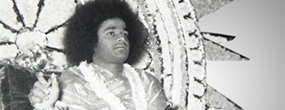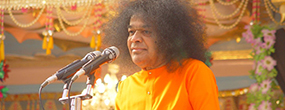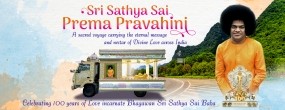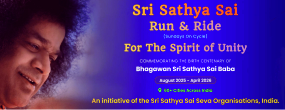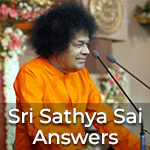The Answers to All Your Questions
Q. What is the core of Seva in the Organisation?
Members ask: We are serving others relieving their pain or misery. We are feeding the hungry, poor; we are engaged in many good acts; are these not Sadhana? But this is not service to others, it is service to yourself. A person may invite all of you Office-bearers for a dinner! And he may declare afterwards, “I gave a dinner to all the delegates.” He too sat and ate with all the delegates and so, he served himself too, when he served the others, did he not? He derived joy as a result of the dinner he arranged and so, it was a piece of service rendered to himself ultimately. When you feel that it is not the ‘other’ whom you are serving but yourself then, your service will be better and more effective. Establish this attitude more and more firmly in your mind.
If you do good, you get good from those around you and from the universal entity, God. If you do bad, you get bad. Divinity but resounds, reflects, reacts! God has no favourites, no prejudices. The thought creates a desire, the desire creates a form through which it is expressed. Have good thoughts, you get desires in good forms.
- Third All India Conference, Prasanthi Nilayam | November 20-21, 1970
Q.How is our approach to Seva different from other organisations?
Manava Seva (the service of man) is really Madhava Seva (service offered to God). There are various societies rendering social service nowadays, but, the service does not warm the heart; it is done as a cold routine affair, or as a showy performance, with a great deal of expensive hullabaloo! These societies have reduced the land to its present deplorable condition. The inclinations of the mind, the implications of speech, and the indications of deeds have to be coordinated and harmonised. That is the test of the success of our Organisation; that is the surest means of achieving it. Identify the group with which you work as your own self. Do not allow this to be a copybook maxim but try to put it into daily practice. Through the group you can earn Samasta-Samarasa-Sahanubhuti, that is to say, “awareness of, and empathy with the feelings of one and all.” That is the spring of unalloyed Bliss… All the Organisational units are being activated by One Divine Force, all are activated by One Principle. Resolve to identify it and experience it; then, the purpose of the Organisation is served, use the unique human characteristics – discrimination, wisdom, detachment – Viveka, Vijnana and Vairagya – and drive at that Realisation.
- Fourth All India Conference, Madras | December 22-23, 1971
Q.What is the uniqueness of the opportunity to serve in the Organisation?
During no previous Yuga did man have this unique chance. No Organisation of this nature was established, no Conference of this character was held in the Presence and no opportunity was given then to derive Ananda through such close association, through conversation and singing together. Undoubtedly, you are all singularly fortunate. Therefore, do not let the opportunity slip through your hands. Hold fast to it and make the best of it. With steady faith and enthusiastic devotional activity, tread the path indicated and reach the Goal of Realising the Reality.
- Third All India Conference, Prasanthi Nilayam | November 20-21, 1970
Q.What should be the spiritual endeavour of Office-bearers?
Office bearers of the Organisation should strive to establish yourselves more firmly in your own Truth and strive to demonstrate in your behaviour that you are aware of the Truth that all men are sparks of the same Divine-Spirit. I consider Seva as the most important activity of the Samitis, for it is the highest Sadhana. Do not entangle yourselves in pros and cons, in arguments for and against, whether this way or that, they are the consequence of wrong or perverted scholarship. Love ignores logics; Seva respects no syllogism. Try to observe the rules that have been framed through Love, to channelize the Love that you are required to cultivate. I have said this so often that all of you know my mind already- “Start the Day with Love. Spend the Day with Love. Fill the Day with Love. End the Day with Love. That is the Way of God.”
- Fourth All India Conference, Madras | December 22-23, 1971
Q.What is the spiritual basis of Sadhana?
Time swoops past like a whirlwind, sweeping everything before it. So, one has to concentrate on the duty of the moment, leaving the consequence to the God who prompted it and made the task possible, giving one the chance to carry it out. Time ticks on relentlessly and man is born, lives, dies, rotating on the wheel of Karma and consequence, unaware of the means of escaping from the oncoming destiny. Agony and anxiety have not softened his heart; adventure and achievement have not made him humble. He is proud of his advance in the path of hatred and haughtiness. He revels in cruelty and sin. He displays an unholy satisfaction in immorality and untruth. He has reduced himself to a level lower than that of beasts. Man evokes pity because of this plight. For, he has taken the wrong turn on the road to happiness and landed himself in this hell. No one seeks grief; all seek only joy. Those who know that grief is the interlude between two joys, and joy the interval between two sorrows, will seek to attain the stage when they will not be agitated either by the fierce or the friendly storm! That stage of equanimity is the most desirable. It is what is called Nirvana, when the mind is in perfect equilibrium, unaffected by the blows of fortune, good or bad. For, he knows that he has no right to judge, whether what happens is good or bad, beneficial or other.
To reach this stage of Bliss, man must; live a life of Sadhana. If you take one step after another, however short the step, you can walk even a hundred miles! An eagle, however intrepid in flight, has to spread its wings and venture into the wind so that it can reach a few feet away. If the will to step forward or to unfurl the wing is not there, progress is but a fond dream. The Ichha Shakti (Will Power), has to be sharpened and shaped as an instrument for progress. This individual can fulfil himself only through the service of others, expansion into the universal. Sadhana has to enlarge the vision, enhance the experience, and enthuse the Jivatma to merge in the Paramatma. It starts with the question, “What am I contributing to the welfare of my neighbour? Not, what am I collecting from my neighbour?” You can draw cheques on a bank, only when you have deposited there in; or, you can mortgage your property and take a loan; or the bank may grant you an overdraft. The property on which you can take a loan is the “accumulated merit consequent on the good deeds of previous lives”; the overdraft on which you can draw in times of emergency is Grace, which God showers, when you are sincere and steady enough to deserve it. You must give some surety or something as security, to get a loan; the surety is Divine Grace; the security is the fixing of your faith, the fullness of your surrender. The security and the surety can also be the Guru, who knows the disciple and his attainments and possibilities.
But, about the extent of ancestral property (accumulated merit), you have no information; you cannot count on that. Also, you do not know where to get a Guru who will be a reliable surety or an acceptable security. Such are rare indeed. So, win Grace and earn overdrafts, against a lean day. That is the best source. The more systematic and successful your Sadhana, the more useful you will be for yourself and society.
- Second All India Conference, Prasanthi Nilayam | November 20-21, 1969
Q.How can Organisation Members develop spiritual strength for Seva?
The Divine is the inner core of all beings, near and far, big or small. Expand your consciousness to its uttermost limits. Really speaking, it has no limits at all. This cannot be done on an instalment plan, or on a cash-down basis! No. It is possible only through an inner transformation, through Dhyana, Japa, or Nama Smarana, in the constant contemplation of the Supreme Majesty that is in you. Once you reveal to yourself that Majesty, you can be an effective instrument for service and uplift, among the depressed and the distressed around you. The Divine sprouts in the heart, grows in the Consciousness and blooms in all the mental and physical activities of man. Now the Divine Principle is beyond your experience, because you are not ready to give your best to others, who also contain the selfsame Principle. When you are ready to give, you are entitled to take; not until then…
Do not waver, hesitate or doubt your destiny. Yearn to realise your Reality; that yearning itself will endow you with steady endeavour and the Grace of God which will remove all obstacles. Be an example to others. Do not scatter advice, without the authority born of practical experience. Do not search for the faults of others; seek your own. Love, cooperate, help, serve. That is your prime duty, as leaders of the Sathya Sai Units in your villages.
- Second All India Conference, Prasanthi Nilayam | November 20-21, 1969
Q.For what purpose should Organisation members undertake Seva activities?
The District Presidents and the State Presidents have read reports of the activities of the Organisation in their areas; they also send them to Me, off and on. They contain routine activities of a demonstrative nature, but few items that elevate and enthuse.
They mention ‘poor feeding’ (a word they are not ashamed to use), visits to hospitals, Bhajans in jails, Nagar Sankirtan, etc. For whose sake were these done? Not for the sake of the poor, or the patients or the prisoners, but remember, for your own sake! You take food for your own sake, you take medicine to cure your own illness, don’t you?
You serve, for the sake of deriving Ananda, for the sake of realising your kinship with others, for approaching nearer and nearer to God who is in all, for your own mental and spiritual health and efficiency. Be convinced of that. You join the Samiti, you share in its activities, for your own sake; not for the sake of Sathya Sai or the Samiti started in that name. If you feel that you can earn fame or name, or social status, or some other type of gain by entering this Organisation, there is no place for you in it. This is a place for Sadhana, constant vigilant Sadhana …
The rules we are laying down might appear to some of you as knife-thrusts or hammer-strokes; but they are meant to heal, and to weld. Bow to them and observe them in action sincerely – your path will be soft and smooth, like a path strewn with floral petals.
- Fourth All India Conference, Madras | December 22-23, 1971
Q.Should Organisation Members prioritise service over personal Sadhana?
The body should be guarded and sustained for the service one can do with it to others, or for realising the Atma, while in it. There are some who observe strict discipline in spiritual practices, who follow a rigorous timetable of Japam and Dhyana. Of course, this is good practice, but do not stick to this timetable or that programme, even when you have a call to go to the help of some person, whose need for service is great and urgent. If you give up your Dhyana and serve him, you will benefit more, from the service than what you may gain from the Dhyana.
If you feel that the person next to you suffering pain, needing relief, is a nuisance and move on to some place where your Dhyana will not be disturbed, you surely are not going to get the merit of that Dhyana. It is certainly a wrong you have committed, and you do not deserve Grace. When God Himself comes down and has come down to serve man, He will indeed be pleased if you too serve man. Engage in those activities which will please God, which you feel and know will please God, rather than in activities which will please you. God is pleased with Truth, with Dharma. Dharma guards those who guard Dharma. Know your Dharma and observe it.- Third All India Conference, Prasanthi Nilayam | November 20-21, 1970
Q.What is the Sathya Sai approach to rendering Seva?
Service has become a word of common currency, but its value is very much reduced by the hypocrisy of the users. Really speaking, only those who are afflicted with agony; equal agony, at the sight of pain and suffering, distress or disease, have the right to offer service; for, they are not serving others, they are serving themselves, serving to remove as fast and as intelligently as they can, their own agony. Service to others is the medicine one needs to alleviate the distress which fills one at the sight of distress in another being. Feel that you are serving yourself, that you are curbing your own ego. Otherwise service heightens your self-esteem and develops a sense of superiority; which are both harmful spiritually…
Sathya Sai Seva Samitis have to bear in mind the word, Seva, and take up Seva work enthusiastically. Seva must be directed towards the removal of physical distress, the alleviation of mental agony, and the fulfilment of spiritual yearning. Some regions are affected by floods, some by drought; the Samiti must make efforts to bring relief to the sufferers from these and other natural calamities.
- First All India Conference, Madras | April 20-21, 1967
Q.What are the criteria for selecting a Seva project by the Samiti?
Doing something because it is being done elsewhere is a sign of ignorance. The programmes must satisfy a local need, solve a local difficulty. They must arise out of felt needs and should be adapted to local conditions. It must be taken into consideration whether the place concerned is urban or rural, industrial or agricultural, a pilgrim centre or civic extension, a developing area or a sinking economy, a tribal settlement or a hill station. The person who borrows some idea from another region and executes it might feel satisfied that he has achieved some concrete programme. But do the people whom he tried to benefit feel better and happier? That is the test. Do not think of the fame or praise you win; think of the good that people derive. Do not crave for publicity; crave for the joy that shines in the faces of the people whom you help. Seva brings you nearer to Me. The flower that is your heart gets fragrance by means of the Seva you do, and so it becomes more acceptable to Me. Love is the essence of that fragrance.
- Sixth All India Conference, Prasanthi Nilayam | November 14-22, 1975
Q.How should Seva Dal be trained?
We have Seva Dals in Bombay, Madras, Kerala, Andhra and some other states, but each Dal is being trained without reference to what is being done in other states. All states must have a common badge, a common curriculum of spiritual discipline and study, a common course of practical training in first aid, social service, etc.
- Second All India Conference, Prasanthi Nilayam | November 20-21, 1969
Q.How can participating in Seva Dal activities benefit the Youth?
Youth is a stage of life when self-control, self-examination and self-effort are most needed and least exercised. What a mighty potential for progress is wasted by the empty vagaries of the youth today. If only the courage, optimism, strength and imagination of youth is channelised into constructive channels, how soon the human community can attain peace and prosperity. The youth are drawn easily into wild adventures, acts of bravado and exhibition of group fanaticism. They are given to sudden changes of passion or emotion. All over the world they are being swayed on the waves of anger and adventure. The destiny of nations hangs on the direction the youth will take in these turbulent times. They should not be led into the paths of hypocrisy, deceit or greed. They must act the way they speak and speak the way they think. They should think good thoughts, speak good words and do good deeds. That will give inner joy and contentment. That will make them worthy sons and daughters of this ancient land.
- Sixth All India Conference, Prasanthi Nilayam | November 14-22, 1975
Q.What is the significance of the Seva Dal badge?
The badge on the chest helps to keep off the ego thumping inside, to broaden the heart and to focus all attention on the Lord resident therein. It is like the wheeled stand which helps the child to walk. It must be revered until you transcend it and feel that all mankind is your kin. The badge should not be impurified by your indulging in deleterious habits such as impulsive anger, selfishness, flippant conversation, smoking, drinking, gambling or loitering in unsanctified places.
- Sixth All India Conference, Prasanthi Nilayam | November 14-22, 1975
Q.What is the reward for doing Seva?
The service that you render must reward you, not only with your satisfaction, but with the satisfaction and relief of those whom you serve. When those whom you serve are not relieved or made happy thereby, of what avail is your elation or exultation at the help you have been allowed to offer? You should have the joy of the recipient as your objective. Do not sit back and talk of your having done what is expected of you but try to discover whether your act of service has really been worth-while, whether it has been intelligently rendered with full appreciation of the peculiar circumstances of the individual who needed it. Do not feel that this is an obligation imposed on you by the rules of the Organisation or by the person nominated as your leader. Do not feel that the scarf and badge that you wear are impediments to freedom. They are reminders of the high mission to which you have been initiated, the keys to your Realisation of reality through the Sadhana of Seva. Even when you do not wear the scarf or parade the badge, you must be eager and alert to render Seva to fellow beings who need it.
- Sixth All India Conference, Prasanthi Nilayam | November 14-22, 1975
Q.What are the benefits of doing Seva?
Through Seva you realise that all beings are waves of the ocean of Divinity. No other Sadhana can bring you into the incessant contemplation of the oneness of all living beings. You feel another’s pain as your own; you share another’s success as your own. To see everyone else as yourself and yourself in everyone, that is the core of the Sadhana of Seva.
Again, Seva makes the ego languish for want of food. It makes you humble before the suffering of others, and when you rush to render help, you do not calculate how high or low his social or economic status is. The hardest heart is slowly softened into the softness of butter by the opportunities that the Seva Dal offers. Seva is prescribed as one among the nine steps towards Realisation. You must therefore be earnest about it and welcome all chances to serve the old, sick, disabled, diseased and distressed… Wearing a scarf and badge round the neck is but an indication of the joy that is within reach when you actually serve. Your Seva will be judged with reference to the mental attitude accompanying it. So, whatever work is allotted, do it with fervour, understanding and reverence. In Seva there can be no high or low, for Sai is in all. Sai receives your Seva, to whomsoever you may offer lt. Do not be sad that you have been posted on some duty that keeps you far from Me. Know that I am nearest to him who calls on Me and sees Me in all beings… Let Me tell you that mere execution of some duties enjoined on the Dal by the rules cannot be recognised as Bhakti. Duty done without love is deplorable; duty done with love is desirable. But acts of love that emanate from a person because it is his nature and not because it is enjoined on him as a duty he has to fulfil, is really Divine.
- Sixth All India Conference, Prasanthi Nilayam | November 14-22, 1975


